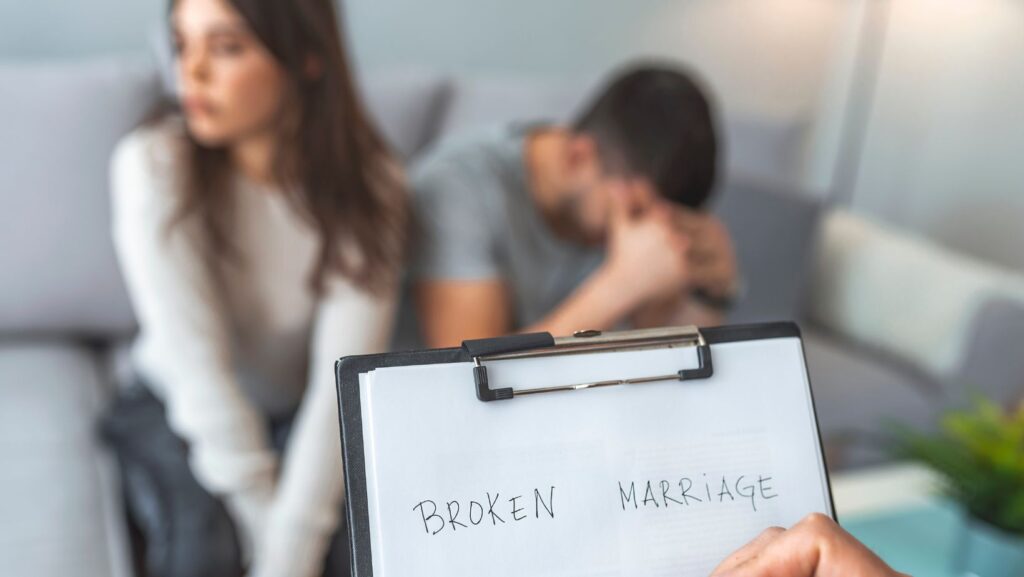Ups and downs in a marriage are inevitable. Conflict and dry spells are a part of married life and do not mean your marriage is “broken”. What matters is how you respond to these challenges, and if they drive you together to solve them or if they drive a wedge between you and your spouse.
This article will go over how to fix a broken marriage and how marriage counseling can help.
What Is Marriage Counseling? What Is Couples Counseling?
A marriage counselor, usually with the title of “Licensed Marriage and Family Therapist” (LMFT), is someone who helps couples through conflicts, dry spells, and growth in their relationship. “Marriage counselor” and “couples counselor” are usually used interchangeably.

A marriage counselor isn’t just someone you see when your marriage is on the brink of collapse. They can also help you manage difficult life transitions, parenting, co-parenting, or managing a physical or mental health illness.
How To Fix A Broken Marriage
Although a marriage counselor can help with all problems big and small, one of the things they do is help marriages that are struggling. “Broken” may not be the right word for these marriages, as many of them are able to heal and live healthy and whole lives.
Some steps to repair a broken marriage include:
- Acknowledge the Issues: Start by openly discussing the challenges in your relationship with your partner. Acknowledging the issues is the first step towards finding solutions and rebuilding trust.
- Communicate Effectively: Work on improving communication by actively listening to each other, expressing your feelings with honesty and empathy, and being open to feedback without judgment.
- Identify Root Causes: Together with your partner, explore the underlying issues that have contributed to the breakdown of your marriage. Understanding the root causes can help you address them effectively.
- Commit to Change: Both partners need to commit to making positive changes and actively participate in the healing process. This may involve letting go of past resentments, adjusting expectations, and prioritizing the relationship.
- Practice Empathy and Forgiveness: Cultivate empathy towards your partner’s perspective and practice forgiveness for past mistakes. Showing compassion and understanding can help in rebuilding emotional connection.
- Work on Intimacy: Focus on rebuilding emotional and physical intimacy in your relationship. Spend quality time together, engage in activities you both enjoy, and nurture the romantic aspects of your connection.
- Set Realistic Goals: Establish clear goals and action steps to work towards resolving conflicts, rebuilding trust, and strengthening your bond. Celebrate small victories along the way to keep motivation high.
- Seek Professional Help: Consider seeking couples counseling near me with a qualified therapist who can provide guidance, tools, and support to navigate the complexities of your relationship and work towards healing.
Remember, repairing a broken marriage takes time, effort, and commitment from both partners. If you are not both ready to make amends, work towards healing, and forgive, then marriage counseling is probably not going to work.

Forgiving your partner does not mean that any wrongs they committed were okay, but it does mean you are committing to not holding a grudge or letting resentment build up because of it. A marriage counselor can help you do this.
Finding Couples Therapy Near You
How do you find a couples therapist or marriage counselor near you? Online directories or word of mouth referrals are a good place to start. You’ll want to find someone you both trust and feel comfortable enough to be vulnerable around. To do this, it’s good to ask yourselves some questions before you attend therapy:
- What are our specific goals for therapy? Sit down with your partner and reflect on what you hope to achieve through couples therapy, such as improving communication, resolving conflicts, or rebuilding trust.
- What type of therapy approach resonates with us? Therapy modalities are research-backed ways of conducting therapy. Although they are proven to be effective, each person may have a different preference.
- What qualifications and experience do we seek in a therapist? Consider the expertise, credentials, and experience level you prefer in a therapist to ensure they can effectively support your relationship.
- Are we comfortable with in-person or virtual sessions? Determine if you prefer face-to-face sessions at a therapist’s office or if virtual sessions better suit your schedules and preferences. It is possible to receive effective marriage counseling virtually.
- What is our budget and insurance coverage for therapy? Check with your insurance provider to know how much each couple’s counseling session will be, and if you have to meet any deductibles.
- How important is the therapist’s background and cultural competence to us? Is it important that your counselor has the same background as you? Do you want them to practice the same faith? Make sure you’re on the same page as your partner on this.
- What time commitments can we make for therapy? Discuss and agree on the time and frequency of therapy sessions that align with both of your schedules and availability.
- What are the non-negotiables for us in a therapist-client relationship? Identify any essential qualities or traits you seek in a therapist to ensure a strong client-therapist connection.
- How will we measure the progress and success of therapy?: Establish clear indicators or markers to track the effectiveness of therapy and ensure it aligns with your goals.
It’s vital that you and your partner are on the same page and willing to move forward with a plan. Good couples counseling comes from mutual effort.
Are you ready to find marriage counseling near you? Don’t wait, reach out today.

